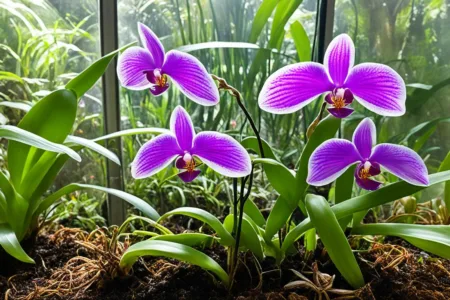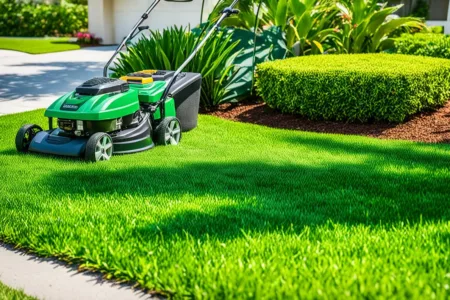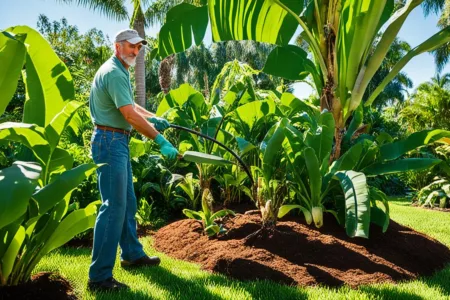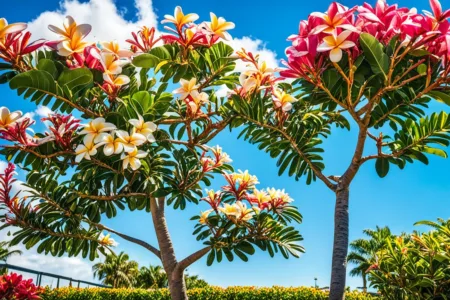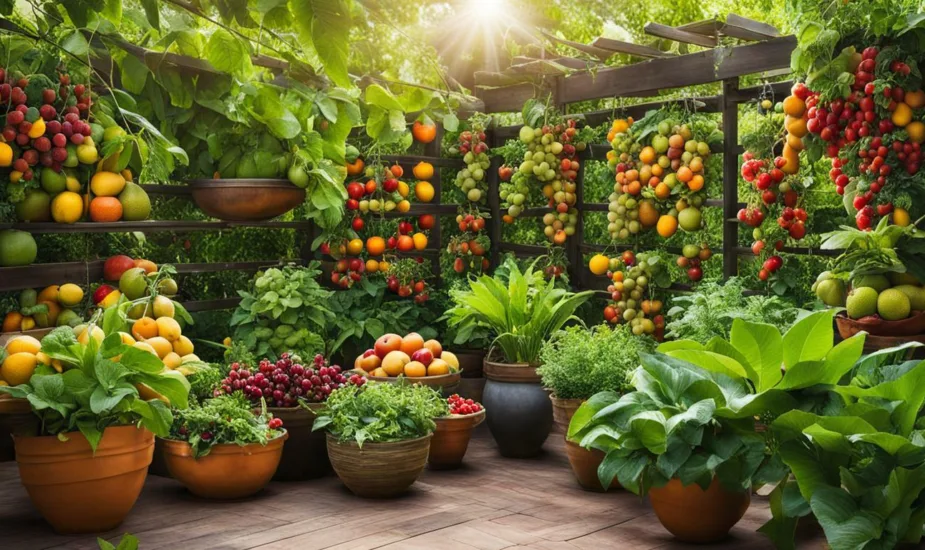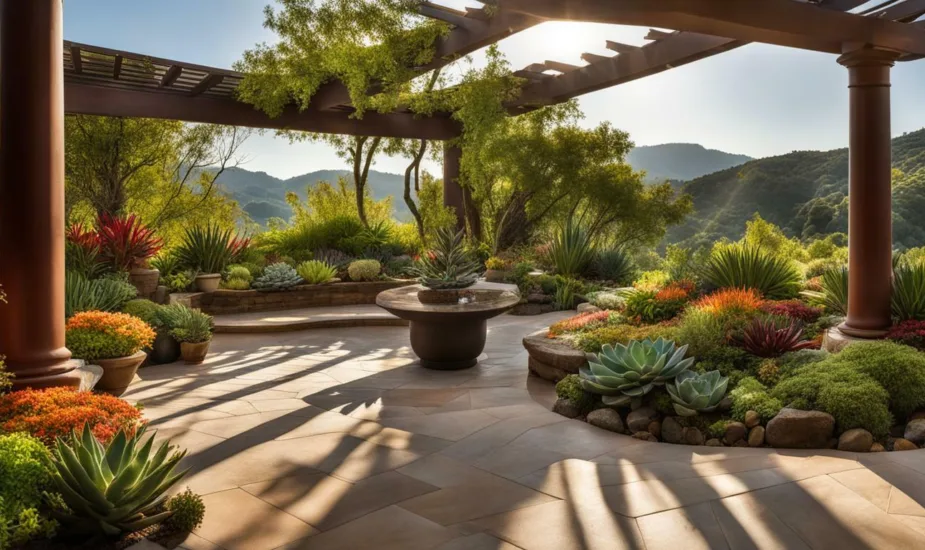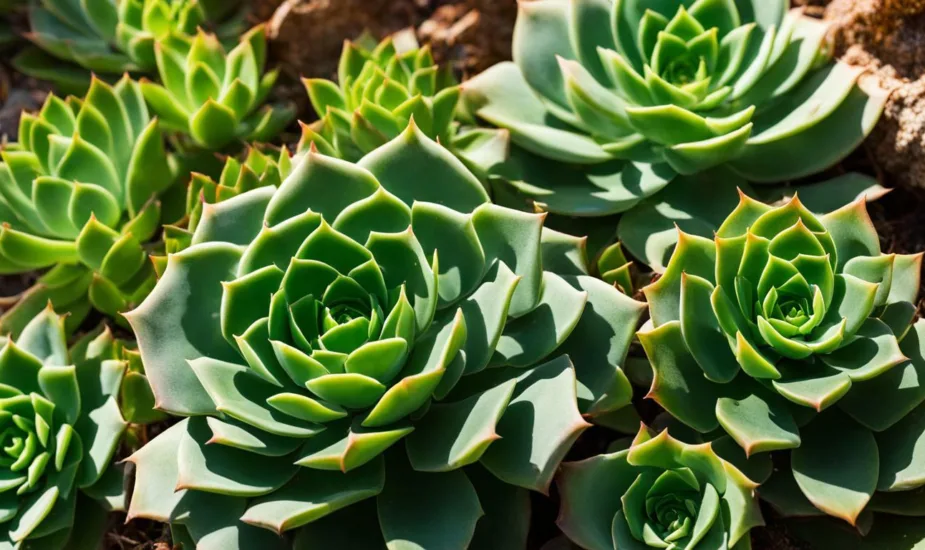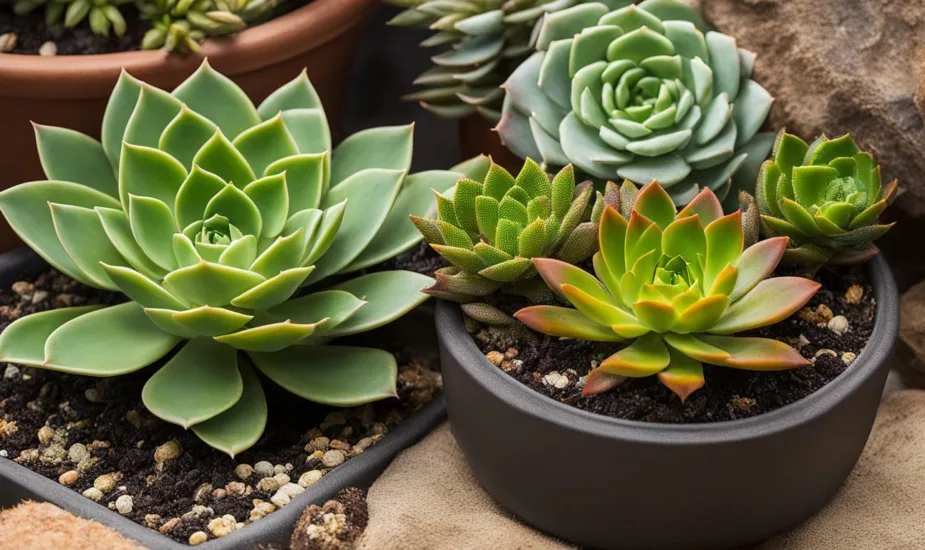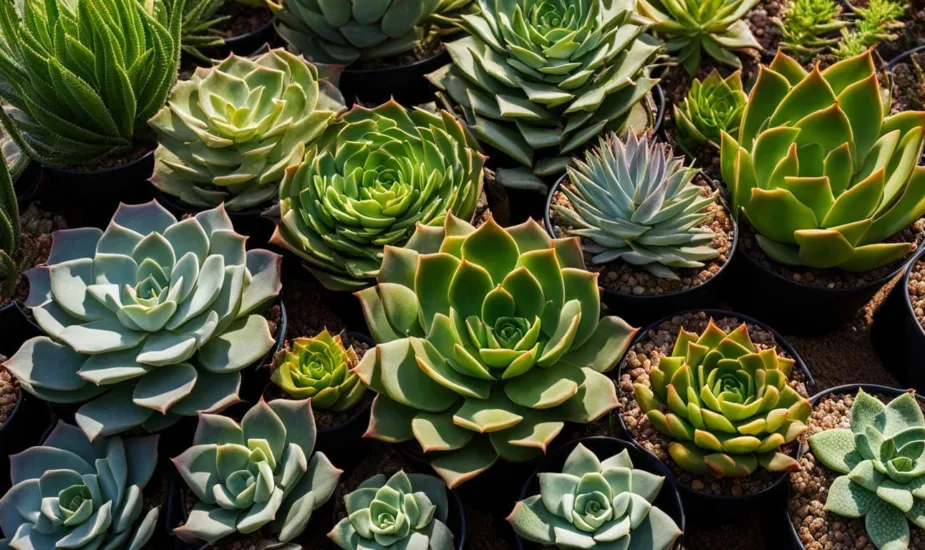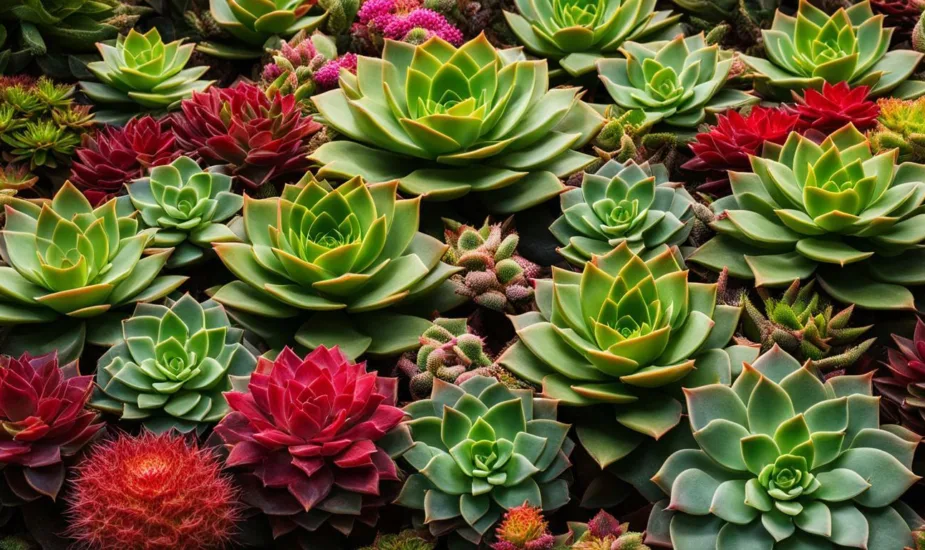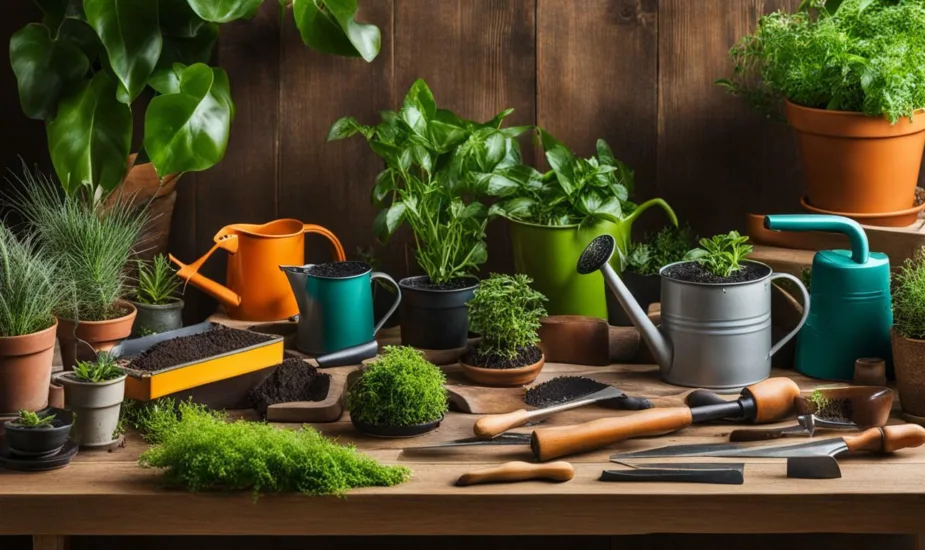Rich Soil, Thriving Plants: Compost Secrets for Container Gardening
If you're looking to grow a bountiful container garden, compost is the way to go. Compost is the ultimate soil conditioner, providing vital nutrients, improving soil texture, and enhancing water-holding capacity.

Incorporating compost into your container gardening routine is key to ensuring your plants stay healthy and vibrant.
Compost is a masterpiece of organic matter. It is made up of decomposed organic materials such as leaves, kitchen scraps, and grass clippings. When these materials break down, they release essential nutrients that enrich the soil, creating a thriving environment for plant growth.
Key Takeaways:
- Compost is essential for container gardening, providing nutrient-rich soil for healthy plant growth.
- Using compost in container gardening improves soil structure, nutrient availability, and water retention.
Understanding the Benefits of Compost for Container Gardening
As a container gardener, using compost is a game-changer and a must-have for healthy plants. Compost is a soil amendment made from decomposed organic matter, such as leaves, grass clippings, and vegetable scraps. The result is a nutrient-rich supplement that improves soil structure, increases nutrient availability, and enhances water retention.
Using compost for container gardening has several benefits, including improved plant growth and yield, increased soil fertility, and reduced dependence on synthetic fertilizers. Unlike synthetic fertilizers, compost feeds plants slowly, providing a steady supply of nutrients over time. Since compost is made from organic materials, it also promotes healthy soil, beneficial microbes, and earthworms. This leads to improved soil structure, water-holding capacity, and a healthier root system.
In addition to the environmental benefits, using compost in container gardening can also save you money in the long run. Rather than purchasing expensive potting mixes, you can create your own compost from kitchen and yard waste. This homemade compost is often superior to purchased potting mixes as it is tailored to the specific needs of your plants and garden.
Best Compost for Container Gardening
When it comes to using compost for container gardening, the best compost is organic compost. Organic compost is made from plant and animal materials that are free from synthetic chemicals and pesticides. This ensures that the compost is safe for both you and your plants.
For container gardening, the best compost is one that has a balanced nutrient profile, good water-holding capacity, and good drainage. A mix of composted leaves, grass clippings, and kitchen scraps can provide all of these benefits. You can also add amendments such as perlite, vermiculite, or coconut coir to improve drainage or water-holding capacity.
Container Gardening Compost Mix
The ideal compost mix for container gardening is a combination of compost, peat moss or coconut coir, and perlite or vermiculite. The compost provides nutrients and beneficial microbes, while the peat moss or coconut coir improves water retention. Perlite or vermiculite help improve drainage, preventing soil compaction, and providing air pockets for the roots to breathe.
When selecting or creating a compost mix for your container garden, it’s essential to consider the needs of your plants. Some plants may prefer a soil mix with more drainage, while others may prefer a more moisture-retentive mix. Research the specific needs of your plants and adjust your compost mix accordingly.

Overall, using compost for container gardening is a smart choice that benefits both your plants and the environment. By understanding the benefits of compost, selecting the right compost mix, and following best practices for applying it to your container garden, you can enjoy the many benefits of using compost for container gardening.
Creating Homemade Compost for Container Gardening
Gardening enthusiasts know that thriving plants begin with healthy soil fed with the right nutrients. While commercial potting mixes are available, I’m going to let you in on a little secret: homemade compost is the way to go for container gardening.
Not only is composting a sustainable and cost-effective solution, but it also helps reduce waste and provides a reliable source of organic matter that you can customize to suit your plants’ needs. Let’s get started on creating your own homemade compost for container gardening!
Step #1: Gather Compost Ingredients
Before I begin composting, I always gather my compost ingredients first. For a good-quality compost, you’ll want to include a mix of nitrogen-rich “green” materials and carbon-rich “brown” materials. Here are some examples:
| Green Materials | Brown Materials |
|---|---|
| Fruit and vegetable scraps | Shredded newspaper or junk mail |
| Coffee grounds and tea leaves | Dry leaves or hay |
| Grass clippings | Wood chips or sawdust (in small quantities) |
It’s essential to maintain a good balance of green and brown materials in your compost bin. Too much green material without adding enough brown material can cause the compost to become too wet and smelly. On the other hand, too much brown material can make the compost dry and slow to break down.
Step #2: Choose a Composting Method
There are several composting methods you can choose from, depending on your space and resources. Here are some popular options:
- Bin Composting: This method involves using a composting bin or container to hold your compost materials. It’s ideal for small spaces and can be done indoors or outdoors.
- Trench Composting: This method is suitable for gardeners who have a lot of space and garden beds. It involves digging a trench in your garden bed, filling it with compost materials, and covering it with soil.
- Vermicomposting: This method involves using worms to break down your compost materials. It’s a great option for apartment or urban gardeners who have limited space.
Step #3: Compost Maintenance
Composting can take anywhere from a few weeks to several months, depending on the method you choose and how often you turn the compost. Here are some tips to ensure your compost stays healthy:
- Turn the compost regularly to aerate it and help break down the materials evenly.
- Keep your compost moist but not too wet. Water it regularly, but don’t let it become waterlogged.
- Avoid adding meat, dairy, or oily foods to your compost as they can attract pests and emit foul odors.
With these simple steps, you can create your very own homemade compost for container gardening. Not only will you be reducing waste and saving money, but you’ll also be providing your plants with the nutrients they need to grow healthy and strong!

Choosing the Right Compost Mix for Container Gardening
When it comes to container gardening, selecting the right compost mix is essential for healthy plant growth. Different plants thrive in different soil conditions, so it is important to choose a compost mix that provides the nutrients and structure that your specific plants require.
One of the best compost mixes for container gardening is a blend of organic materials such as peat moss, vermiculite, and perlite. This mix provides excellent water retention and aeration, as well as essential nutrients for plant growth.
Another option is to create your own custom compost mix using a combination of organic materials such as garden soil, composted manure, and leaf mold. This allows you to tailor the mix to the specific needs of your plants and can help maximize their growth potential.
It is important to note that not all compost mixes are created equal, and some may contain additives or chemicals that can be harmful to your plants. Always read the ingredients carefully and opt for organic, natural compost mixes whenever possible.
| Compost Mix | Benefits |
|---|---|
| Peat Moss, Vermiculite, Perlite Blend | Excellent water retention and aeration, essential nutrients for plant growth |
| Garden Soil, Composted Manure, Leaf Mold Blend | Customizable to specific plant needs, maximizes growth potential |
When selecting a compost mix for your container garden, keep in mind the type of plants you will be growing and their specific soil needs. With the right compost mix, your container garden will thrive and provide you with an abundance of healthy plants.

Essential Compost Ingredients for Container Gardening
Creating nutrient-rich compost requires a mixture of organic materials that provide a range of nutrients and aeration to the soil. As a container gardener, it’s important to select the right combination of ingredients to ensure optimal plant growth and health. Here are some essential compost ingredients for container gardening:
| Ingredient | Benefit |
|---|---|
| Green Materials (e.g. grass clippings, vegetable scraps) | Provides nitrogen and helps with decomposition |
| Brown Materials (e.g. leaves, twigs) | Adds carbon and aids in moisture retention |
| Eggshells | Supplies calcium and helps to balance soil pH |
| Coffee Grounds | Provides nitrogen and can deter pests |
| Composted Manure | Supplies essential nutrients and microbes for plant growth |
| Shredded Newspaper or Cardboard | Adds carbon and helps to maintain soil moisture |
Keep in mind that the ratio of green to brown materials should be roughly 2:1 to maintain adequate decomposition and moisture levels. Additionally, it’s important to avoid adding materials that could potentially harm plants, such as pet waste, meat, or dairy products.

By including these essential compost ingredients in your container gardening routine, you can ensure a thriving and healthy garden full of nutrient-rich soil. Happy composting!
Applying Compost to Potted Plants
If you want to keep your potted plants healthy and thriving, adding compost to their soil is a great way to start. Applying compost to potted plants can be done in several ways, depending on the stage of growth and the type of plant. Here are some techniques:
Top-Dressing
The easiest way to add compost is to apply it to the top of the soil. This is called top-dressing and involves adding a layer of compost on the soil surface. To do this, gently scrape away a few inches of soil in the pot, sprinkle a layer of compost on top, and then replace the soil. Top-dressing is most effective for established plants that do not require replanting.
Mixing with Potting Soil
Another way to apply compost to potted plants is to mix it with potting soil. This technique works well when repotting plants or starting new plants from seeds. Mix equal parts of potting soil and compost in a container and then add it to the pot. Make sure to leave some space at the top of the pot for watering.
Creating Compost Tea
Compost tea is a liquid fertilizer that is made by steeping compost in water. To create compost tea, place a few handfuls of compost in a muslin bag or old pillowcase and then soak it in a bucket of water for a few days, stirring occasionally. The resulting liquid can be poured directly onto the soil or sprayed onto the leaves of the plant. Compost tea is a great way to provide your potted plants with a quick nutrient boost.

Remember that your potted plants will benefit from regular applications of compost throughout the growing season. Applying compost to potted plants is an easy and effective way to provide them with the nutrients they need for healthy growth and development. Try these techniques and watch your plants thrive!
Maximizing Compost Benefits in Small Gardens
As someone who loves container gardening, I know firsthand how important it is to make the most out of every inch of space. That’s why composting is such an essential practice. With a few simple strategies, you can maximize the benefits of compost in small gardens and ensure your plants thrive.
Choose the Right Containers
When gardening in small spaces, it’s essential to choose the right containers for your plants. Look for containers that are appropriate for the size of your plants and ensure they have adequate drainage. Additionally, consider using containers that are made from materials like terracotta, which allow air to circulate around the roots of your plants.
Strategically Place Your Plants
When space is at a premium, it’s important to be strategic about plant placement. Consider grouping plants together that have similar water and nutrient needs. Additionally, think about using vertical space to your advantage. Consider hanging baskets or using trellises for vining plants.
Be Mindful of Compost Application
When using compost in small gardens, it’s important to be mindful of how much you’re applying. While compost is a fantastic soil amendment, too much can actually be detrimental to your plants. Generally, a depth of 2-4 inches of compost is sufficient. Additionally, consider using compost tea as a supplemental soil amendment to provide plants with additional nutrients.
Rotate Your Crops
Rotating your crops is essential to ensuring long-term soil health in small gardens. By rotating crops every season, you can help prevent the buildup of pests and diseases in your soil. Additionally, rotating crops can help ensure that soil nutrients remain balanced.
Companion Plant
Companion planting is another fantastic way to maximize the benefits of your compost in small gardens. Certain plants have natural synergies and can help support each other’s growth. For example, planting herbs like basil and parsley with tomatoes can help improve the flavor of your tomatoes while also deterring pests.

By following these simple strategies, you can make the most out of your compost efforts in small gardens. With nutrient-rich soil and healthy plants, you’ll be well on your way to a bountiful harvest.
Troubleshooting Common Compost Issues in Container Gardening
Though compost is generally considered a safe and effective soil amendment, container gardeners may encounter some issues when using it. Here are some common problems and their solutions:
Odor
Compost should have a pleasant earthy smell, but if it smells sour or like ammonia, it may be too wet or not properly aerated. To fix this, turn the compost pile to add oxygen and dry out any excess moisture.
Pests
While compost can attract beneficial insects, it may also attract unwanted pests like flies or rodents. To prevent this, cover the compost pile with a lid or layer of soil, and avoid adding meat or dairy scraps.
Excessive Moisture
Overwatering or adding too many wet ingredients to the compost pile can cause it to become too moist, leading to a lack of oxygen and foul odors. To correct this, add dry materials like leaves or shredded paper to absorb excess moisture.
By addressing these common issues, you’ll be able to enjoy all the benefits of compost in your container garden without any unpleasant surprises.

Enhancing Compost Effectiveness with Complementary Practices
Using compost for container gardening is a fantastic way to provide your plants with the nutrients they need for healthy growth. However, there are additional practices you can use to enhance its effectiveness even further. Here are some complementary methods to try:
Companion Planting
Companion planting involves planting different types of plants together that can benefit each other. For example, planting basil with tomatoes can help repel pests and improve the flavor of the tomatoes.
Companion planting can also help improve soil health by promoting biodiversity and reducing the risk of soil-borne diseases. Consider planting nitrogen-fixing plants like clover or beans alongside other plants to improve soil fertility.
Crop Rotation
Crop rotation is the practice of planting different crops in different locations each season to prevent soil depletion and reduce disease and pest problems. By rotating crops, you can also take advantage of different plants’ nutrient needs to enhance soil fertility.
For container gardening, you can rotate your plants by swapping out the soil and selecting new plants with different nutrient requirements. This practice can help prevent nutrient depletion and pest problems while promoting soil health.
Organic Pest Control
Using organic pest control methods can help prevent the use of harmful chemicals in your garden while protecting your plants from pest damage. Some effective methods include using insecticidal soaps, neem oil, and natural predators like ladybugs and praying mantises.
Additionally, practicing good garden hygiene by cleaning up plant debris and removing weeds can help prevent pest problems before they start. By reducing the need for chemical pesticides, you can maintain the health and vitality of your plants while promoting soil health.

By combining the use of compost with these complementary practices, you can create a thriving container garden with healthy, nutrient-rich soil. Experiment with different methods to find the combination that works best for your plants and enjoy the benefits of a bountiful harvest!
Conclusion
In conclusion, compost is an essential element for successful container gardening. By providing nutrient-rich soil, compost enhances plant growth, improves soil structure and water retention, and even aids in organic pest control.
As a container gardener, I recommend creating your own homemade compost using organic materials like food waste, grass clippings, and leaves. By selecting the right compost mix and adding essential compost ingredients, you can cater to the specific needs of your container garden.
To maximize the benefits of compost in small gardens, you can carefully select the container size and placement, and adjust compost application frequency. Remember to troubleshoot common compost issues and enhance its effectiveness with complementary practices like companion planting and crop rotation.
Overall, incorporating compost in your container gardening routine is a simple and effective way to support healthy plant growth and enjoy bountiful yields. So why not give it a try and see the difference for yourself? Happy composting and happy gardening!
FAQ
Q: How important is compost in container gardening?
A: Compost is crucial in container gardening as it provides nutrient-rich soil for healthy plant growth.
Q: What are the benefits of using compost in container gardening?
A: Using compost in container gardening improves soil structure, increases nutrient availability, and enhances water retention.
Q: How can I create homemade compost for container gardening?
A: You can create homemade compost for container gardening by following a step-by-step guide and using recommended compost ingredients and methods.
Q: How do I choose the right compost mix for container gardening?
A: To choose the right compost mix for container gardening, consider the specific needs of your plants and the type of container you’re using.
Q: What are the essential compost ingredients for container gardening?
A: The key compost ingredients for container gardening include organic matter, such as kitchen scraps, yard waste, and coffee grounds.
Q: How do I apply compost to potted plants?
A: Compost can be applied to potted plants through top-dressing, mixing with potting soil, or creating compost tea.
Q: How can I maximize the benefits of compost in small gardens?
A: To maximize the benefits of compost in small gardens, carefully select containers, plan plant placement, and consider compost application frequency.
Q: What are some common compost issues in container gardening and how do I troubleshoot them?
A: Common compost issues in container gardening include odor, pests, and excessive moisture. Solutions include proper composting techniques and regular maintenance.
Q: How can I enhance compost effectiveness in container gardening?
A: Complementary practices such as companion planting, crop rotation, and organic pest control can enhance the effectiveness of compost in container gardening.
Q: What is the conclusion regarding compost for container gardening?
A: Compost is essential for successful container gardening as it provides the necessary nutrients for thriving plants.
 Little Garden Tips
Little Garden Tips
